| Listing 1 - 10 of 31 | << page >> |
Sort by
|
Book
ISBN: 9055690945 Year: 1999 Publisher: The Hague : Thesus,
Abstract | Keywords | Export | Availability | Bookmark
 Loading...
Loading...Choose an application
- Reference Manager
- EndNote
- RefWorks (Direct export to RefWorks)
801.56 --- Syntaxis. Semantiek --- 801.56 Syntaxis. Semantiek

ISBN: 0585474117 9780585474113 0080435815 9780080435817 Year: 1999 Publisher: Amsterdam Pergamon
Abstract | Keywords | Export | Availability | Bookmark
 Loading...
Loading...Choose an application
- Reference Manager
- EndNote
- RefWorks (Direct export to RefWorks)
Linguistics --- Languages & Literatures --- Philology & Linguistics --- 801.56 --- Syntaxis. Semantiek --- 801.56 Syntaxis. Semantiek --- Comparative linguistics
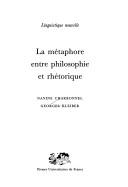
ISBN: 2130495931 9782130495932 Year: 1999 Publisher: Paris Presses universitaires de France
Abstract | Keywords | Export | Availability | Bookmark
 Loading...
Loading...Choose an application
- Reference Manager
- EndNote
- RefWorks (Direct export to RefWorks)
Linguistics --- retoriek --- Theory of knowledge --- Metaphor --- Métaphore --- 801.56 --- Parabole --- Figures of speech --- Reification --- Syntaxis. Semantiek --- Metaphor. --- 801.56 Syntaxis. Semantiek --- Métaphore
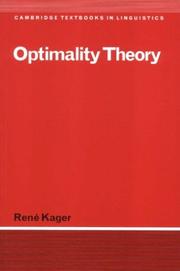
ISBN: 9780521580199 9780511812408 9780521589802 0521580196 0521589800 Year: 1999 Publisher: Cambridge Cambridge University Press
Abstract | Keywords | Export | Availability | Bookmark
 Loading...
Loading...Choose an application
- Reference Manager
- EndNote
- RefWorks (Direct export to RefWorks)
Optimality theory (Linguistics) --- Optimality theory (Linguistics). --- 801.56 --- 801.56 Syntaxis. Semantiek --- Syntaxis. Semantiek --- Optimality (Linguistics) --- Optimization (Linguistics) --- Generative grammar --- Grammar
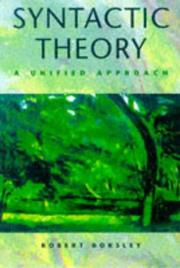
ISBN: 0340706104 9780340706107 9781315832463 9781317858935 9781317858942 9781138178458 Year: 1999 Publisher: London Arnold
Abstract | Keywords | Export | Availability | Bookmark
 Loading...
Loading...Choose an application
- Reference Manager
- EndNote
- RefWorks (Direct export to RefWorks)
yntactic theory is central to the study of language. This innovative book introduces the ideas which underlie most approaches to syntax and shows how they have been developed within two broad frameworks: principles and parameters theory and phrase structure grammar. While other texts either concentrate on one theory or treat them as totally separate, here both approaches are introduced together, highlighting the similarities as well as the differences. Thoroughly updated in the light of major recent developments, this second edition includes expanded explanations of the main characteristics of the two theories, summaries of the main features, exercises reinforcing key points and suggestions for further investigation.
English language --- Grammar --- Grammar, Comparative and general --- Syntax. --- 801.56 --- -Comparative grammar --- Grammar, Philosophical --- Grammar, Universal --- Language and languages --- Philosophical grammar --- Linguistics --- Philology --- Syntaxis. Semantiek --- Syntax --- Grammar, Comparative --- -Syntaxis. Semantiek --- 801.56 Syntaxis. Semantiek --- -801.56 Syntaxis. Semantiek --- Comparative grammar --- Grammaire comparée --- Syntaxe --- Syntaxe. --- Grammar, Comparative and general - Syntax. --- Grammar, Comparative and general Syntax

ISBN: 0195123522 0195123530 Year: 1999 Publisher: New York (N.Y.) Oxford university press
Abstract | Keywords | Export | Availability | Bookmark
 Loading...
Loading...Choose an application
- Reference Manager
- EndNote
- RefWorks (Direct export to RefWorks)
802.0-56 --- 802.0 --- 801.56 --- English language --- -Germanic languages --- Engels: syntaxis; semantiek --- Engels. Engelse taalkunde --- Syntaxis. Semantiek --- Syntax --- Engelse taal --- Syntax. --- syntaxis --- -Engels: syntaxis; semantiek --- 801.56 Syntaxis. Semantiek --- 802.0 Engels. Engelse taalkunde --- 802.0-56 Engels: syntaxis; semantiek --- syntaxis. --- -801.56 Syntaxis. Semantiek --- Germanic languages
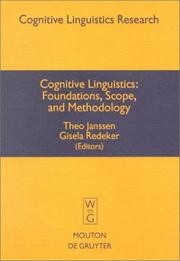
ISBN: 311016163X 3110161648 1306272343 3110803461 9783110803464 9783110161649 9783110161632 Year: 1999 Volume: 15 Publisher: Berlin Mouton de Gruyter
Abstract | Keywords | Export | Availability | Bookmark
 Loading...
Loading...Choose an application
- Reference Manager
- EndNote
- RefWorks (Direct export to RefWorks)
No detailed description available for "Cognitive Linguistics".
Psycholinguistics --- Cognitieve spraakkunst --- Cognitive grammar --- Grammaire cognitive --- Grammar [Cognitive ] --- Spraakkunst [Cognitieve ] --- Cognitive grammar. --- 801.56 --- Syntaxis. Semantiek --- Languages & Literatures --- Philology & Linguistics --- 801.56 Syntaxis. Semantiek --- Cognitive linguistics --- Linguistique cognitive --- Psycholinguistique cognitive --- Grammar, Comparative and general
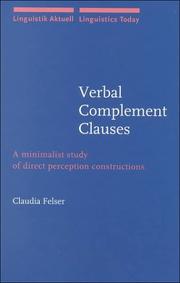
ISBN: 9027227462 1556199090 9786612163470 1282163477 9027299277 9789027299277 Year: 1999 Publisher: Amsterdam Benjamins
Abstract | Keywords | Export | Availability | Bookmark
 Loading...
Loading...Choose an application
- Reference Manager
- EndNote
- RefWorks (Direct export to RefWorks)
This monograph examines the syntax of bare infinitival and participial complements of perception verbs in English and other European languages, and investigates the general conditions under which verbal complement clauses are licensed. The introductory chapter is followed by an overview of the major syntactic and semantic characteristics of non-finite complements of perception verbs in English. The third chapter presents an analysis within the framework of Chomsky's (1995) Minimalist Program according to which event-denoting complements are minimally realised as projections of an aspectual hea
801.56 --- 801.56 Syntaxis. Semantiek --- Syntaxis. Semantiek --- Grammar, Comparative and general -- Clauses. --- Grammar, Comparative and general -- Complement. --- Grammar, Comparative and general -- Verb phrase. --- Philology & Linguistics --- Languages & Literatures --- Grammar, Comparative and general --- Verb phrase. --- Complement. --- Clauses.
Book
ISBN: 9061686652 9789061686651 Year: 1999 Publisher: Nijmegen SUN
Abstract | Keywords | Export | Availability | Bookmark
 Loading...
Loading...Choose an application
- Reference Manager
- EndNote
- RefWorks (Direct export to RefWorks)
Dans la métaphore, on voit ordinairement un usage particulier, “ figuratif ”, du langage, propre à la poésie et à la rhétorique. Lakoff et Johnson critiquent ce point de vue ; ils montrent que notre langage tout entier, dans son usage le plus quotidien et terre à terre, est traversé par la métaphore. Il y a des aspects fondamentaux de notre expérience dont nous ne pouvons pas ne pas parler de façon métaphorique, tout simplement parce que les concepts au moyen desquels nous appréhendons ces aspects de l’expérience sont d’emblée métaphoriques. Il y a métaphore, selon Lakoff et Johnson, lorsque nous appréhendons quelque chose – un aspect de la réalité – en termes d’autre chose. L’étude minutieuse de notre langage quotidien révèle que nous traitons le temps sur le modèle de l’espace, la discussion sur le modèle de la guerre, etc. Ces métaphores (largement culturelles) ne sont pas de simples façons de parler : elles sont constitutives de notre pensée, de notre expérience du monde, et informent ce que nous appelons la “ réalité ”.
Sociology of culture --- Metaphor --- Language and languages --- Truth --- Concepts --- Philosophy --- 801.56 --- Syntaxis. Semantiek --- Metaforen --- 801.56 Syntaxis. Semantiek --- Metaforen. --- Lexicology. Semantics --- Philosophy of language --- Language and languages - Philosophy
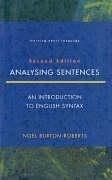
ISBN: 0582248760 9780582248762 Year: 1999 Publisher: London Longman
Abstract | Keywords | Export | Availability | Bookmark
 Loading...
Loading...Choose an application
- Reference Manager
- EndNote
- RefWorks (Direct export to RefWorks)
English language --- Sentences --- Syntax --- -802.0 --- 801.56 --- Germanic languages --- Engels. Engelse taalkunde --- Syntaxis. Semantiek --- 801.56 Syntaxis. Semantiek --- 802.0 Engels. Engelse taalkunde --- Phrase --- Sentences. --- Grammar --- Syntax. --- Anglais (Langue) --- Syntaxe --- 802.0 --- English language - Sentences --- English language - Syntax
| Listing 1 - 10 of 31 | << page >> |
Sort by
|

 Search
Search Feedback
Feedback About UniCat
About UniCat  Help
Help News
News